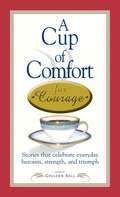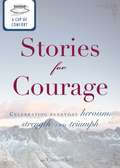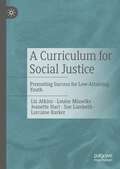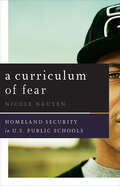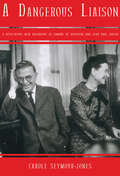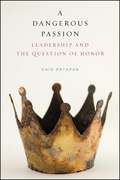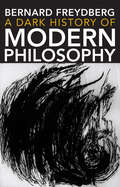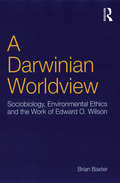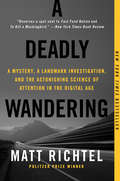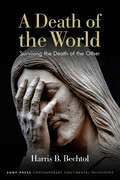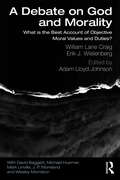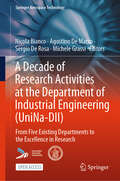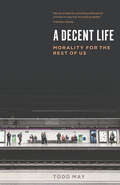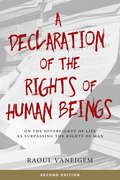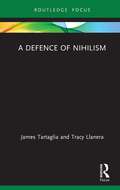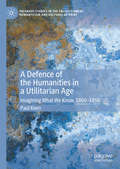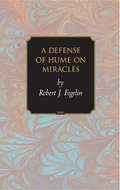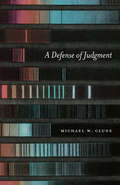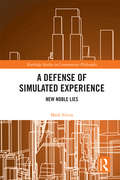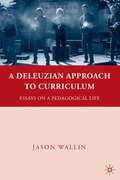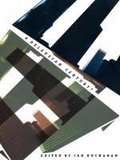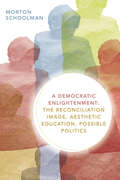- Table View
- List View
A Cup of Comfort Courage
by Colleen SellTo avid fans around the world, A Cup of Comfort has gained recognition as the #1 series for providing a pick-me-up when readers need it most-as well as for remarkable stories that turn the ordinary into the extraordinary. A Cup of Comfort for Courage is the boldest volume yet, celebrating heroines and heroes who transformed the lives of everyone who knows them. This remarkable collection tells of more than fifty advocates, hard workers, and small-town stars, such as: A young immigrant who follows the ancient advice to "go west"--and creates her own American dream A high school football hero who braves a strong current to save more than a dozen lives when a catastrophic flood washes away a school bus A young woman who escapes war-torn Bosnia with nothing but the clothes on her back and her daughter in her arms A young woman who survives a near-fatal car accident and not only regains her mobility, but summons the strength to hike the 2,100-mile Appalachian Trail A coal miner who holds back the flow of oncoming water in a tunnel--just long enough for his comrades to escape certain death! The stories in A Cup of Comfort for Courage will kindle the spirit of its readers and offer hope whenever they need it. It's nothing less than a supportive friend and a powerful mentor in times of struggle-and triumph.
A Cup of Comfort Courage: Stories That Celebrate Everyday Heroism, Strength, and Triumph
by Colleen SellTo avid fans around the world, A Cup of Comfort has gained recognition as the #1 series for providing a pick-me-up when readers need it most-as well as for remarkable stories that turn the ordinary into the extraordinary. A Cup of Comfort for Courage is the boldest volume yet, celebrating heroines and heroes who transformed the lives of everyone who knows them.This remarkable collection tells of more than fifty advocates, hard workers, and small-town stars, such as:A young immigrant who follows the ancient advice to "go west"—and creates her own American dreamA high school football hero who braves a strong current to save more than a dozen lives when a catastrophic flood washes away a school busA young woman who escapes war-torn Bosnia with nothing but the clothes on her back and her daughter in her armsA young woman who survives a near-fatal car accident and not only regains her mobility, but summons the strength to hike the 2,100-mile Appalachian TrailA coal miner who holds back the flow of oncoming water in a tunnel—just long enough for his comrades to escape certain death!The stories in A Cup of Comfort for Courage will kindle the spirit of its readers and offer hope whenever they need it. It’s nothing less than a supportive friend and a powerful mentor in times of struggle-and triumph.
A Cup of Comfort Stories for Courage
by Colleen SellIn A Cup of Comfort Stories for Courage, you'll find the heroines and heroes who have transformed the lives of everyone who knows them. These three stories will kindle your spirit and offer you hope whenever you need it. It's nothing less than a supporting friend a powerful mentor in times of struggle--and triumph.
A Cup of Comfort Stories for Courage: Celebrating everyday heroism, strength, and triumph
by Colleen SellIn A Cup of Comfort Stories for Courage, you’ll find the heroines and heroes who have transformed the lives of everyone who knows them. These three stories will kindle your spirit and offer you hope whenever you need it. It’s nothing less than a supporting friend a powerful mentor in times of struggle - and triumph.
A Curriculum for Social Justice: Promoting Success for Low-Attaining Youth
by Liz Atkins Louise Misselke Jeanette Hart Sue Lambeth Lorraine BarkerThis book reports the outcomes of a research project which involved developing and implementing a research-informed curriculum for low-attaining further education students. Key aims of the curriculum were to ameliorate some of the social and educational disadvantages faced by the students, and to support secure and sustainable transitions to employment or further education. The book begins by outlining the characteristics of the lowest-attaining young people and considering the challenges they face. Subsequent chapters describe the educational and geographic contexts, the curriculum, and the pedagogical approaches adopted. It moves on to describe the outcomes of the project, drawing on narratives of individual students and staff to illustrate the benefits of a broader curriculum which acknowledges earlier disadvantage. The book concludes with a discussion of how the curriculum could be adapted in different contexts and considers the implications of such change in terms of policy, practice, future research and social justice.
A Curriculum of Fear: Homeland Security in U.S. Public Schools
by Nicole NguyenWelcome to Milton High School, where fear is a teacher&’s best tool and every student is a soldier in the war on terror. A struggling public school outside the nation&’s capital, Milton sat squarely at the center of two trends: growing fear of resurgent terrorism and mounting pressure to run schools as job training sites. In response, the school established a specialized Homeland Security program. A Curriculum of Fear takes us into Milton for a day-to-day look at how such a program works, what it means to students and staff, and what it says about the militarization of U.S. public schools and, more broadly, the state of public education in this country. Nicole Nguyen guides us through a curriculum of national security–themed classes, electives, and internships designed through public-private partnerships with major defense contractors like Northrop Grumman and federal agencies like the NSA. She introduces us to students in the process of becoming a corps of &“diverse workers&” for the national security industry, learning to be &“vigilant&” citizens; and she shows us the everyday realities of a program intended to improve the school, revitalize the community, and eliminate the achievement gap. With reference to critical work on school militarization, neoliberal school reform, the impact of the global war on terror on everyday life, and the political uses of fear, A Curriculum of Fear maps the contexts that gave rise to Milton&’s Homeland Security program and its popularity. Ultimately, as the first ethnography of such a program, the book provides a disturbing close encounter with the new normal imposed by the global war on terror—a school at once under siege and actively preparing for the siege itself.
A Dangerous Liaison: A Revelatory New Biography of Simon de Beauvoir and Jean-Paul Sartre
by Carole Seymour-JonesThe renowned biographer offers a tale of intellectual and romantic rivalry in this &“dazzling portrait of Sartre and De Beauvoir&’s relationship&” (The Guardian). Jean-Paul Sartre and Simone de Beauvoir were two of the twentieth century&’s most prominent authors and philosophers, and the story of their decades-long relationship is one of the most famous literary romances of all time. From the corridors of the Sorbonne to the cafés of Paris&’s Left Bank, Sartre and de Beauvoir were intimate rivals in both intellectual debate and sexual conquest. In A Dangerous Liaison, Carole Seymour-Jones vividly describes how the beautiful and gifted de Beauvoir fell in love with the squinting, arrogant, hard-drinking Sartre. We learn about that first summer of 1929, filled with heated debates and dangerous ideas that led them to experiment with new ways of living. We hear how Sartre compromised with the Nazis and fell into a Soviet honey-trap. And, thanks to recently discovered letters written by the avowed feminist de Beauvoir, Seymour-Jones reveals the full story behind the couple&’s philosophy of free love, including de Beauvoir&’s lesbianism and her pimping of younger girls for Sartre in order to keep his love.
A Dangerous Passion: Leadership and the Question of Honor
by Haig PatapanA Dangerous Passion argues that leadership and honor are mutually constitutive and that this dynamic relationship fundamentally shapes the character of political practice. Haig Patapan shows how our contemporary blindness to this leadership-honor dynamic and neglect of the significance of honor (and shame) in modern politics have caused us to fundamentally misunderstand the nature of leadership. We have lost sight of how honor shapes the ambitions and aspirations of those who seek political office, and the opportunities and limits it imposes on leaders when engaging with their followers. What has been obscured are the two faces of honor: how it is the dangerous passion that fuels the ambitions of the glory seekers to pursue tyranny and empire, as well as being the source of good leadership that is founded on noble ambition and sacrifice for the common good. Patapan examines classical magnanimity, Machiavellian glory, and Hobbesian-dispersed leadership, views that continue to be debated, and then offers insights from these debates to illuminate a series of contemporary political challenges for leaders, including the politics of fame, identity, and nationalism.
A Dark History of Modern Philosophy (Studies in Continental Thought)
by Bernard FreydbergThis provocative reassessment of modern philosophy explores its nonrational dimensions and connection to ancient mysteries.Delving beneath the principal discourses of philosophyfrom Descartes through Kant, Bernard Freydberg plumbs the previously concealed dark forces that ignite the inner power of modern thought. He contends that reason itself issues from an implicit and unconscious suppression of the nonrational. Even the modern philosophical concerns of nature and limits are undergirded by a dark side that dwells in them and makes them possible.Freydberg traces these dark sources to the poetry of Hesiod, the fragments of Heraclitus and Parmenides, and the Platonic dialogues and claims that they rear their heads again in the work of Spinoza, Schelling, and Nietzsche. Freydberg does not set forth a critique of modern philosophy but explores its intrinsic continuity with its ancient roots.
A Darkling Plain
by Kristen Renwick Monroe Kristen Renwick Monroe Chloe Lampros-Monroe Jonah Robnett Pellecchia Chloe Lampros-MonroeHow do people maintain their humanity during wars? Despite its importance, this question receives scant scholarly attention, perhaps because war is overwhelming. The generally accepted belief is that wars bring out the worst in us, pitting one against another. "War is hell," William Tecumseh Sherman famously noted, and even "just" wars are massively destructive and inhumane. Since ethics is concerned with discovering what takes us to a morally superior place, one conducive to betterment and happiness- studying what helps people survive wartime trauma thus becomes an extremely valuable enterprise. A Darkling Plain fills an important scholarly void, analyzing wartime stories that reveal much about our capacity to process trauma, heal wounds, reclaim lost spirits, and derive meaning and purpose from the most horrific of personal events.
A Darwinian Worldview: Sociobiology, Environmental Ethics and the Work of Edward O. Wilson
by Brian BaxterDarwin's theory of evolution by natural selection is considered in its application to human beings in this book. Brian Baxter examines the various sociobiological approaches to the explanation of human behaviour which view the human brain, and so the human mind, as the product of evolution, and considers the main arguments for and against this claim. In so doing he defends the approaches against some common criticisms, such as the charge that they are reductionist and dehumanising. The implications of these arguments for the social sciences and humanities are assessed, as is the naturalistic view of ethics to which they lead. A key issue examined in the book is the connection between this Darwinist perspective on human beings and modern environmental ethics, which also often assume that human beings are part of an evolved living world. The implications of these positions for the meaningfulness of human life are also examined. Throughout the discussion the positions in sociobiology and environmental ethics developed by Edward O. Wilson are taken as an exemplar of the characteristic features of a Darwinian worldview, and the arguments of Wilson and his chief critics are thoroughly examined.
A Deadly Wandering
by Matt RichtelA landmark exploration of the vast and expanding impact of technology, rivetingly told through the lens of a deadly collisionOne of the year's most original and masterfully reported books, A Deadly Wandering by Pulitzer Prize-winning New York Times journalist Matt Richtel interweaves the cutting-edge science of attention with the tensely plotted story of a mysterious car accident and its aftermath to answer some of the defining questions of our time: What is technology doing to us? Can our minds keep up with the pace of change? How can we find balance? Through Richtel's beautifully constructed narrative, a complex and far-reaching topic becomes intimate and urgent--an important call to reexamine our own lives.On the last day of summer, an ordinary Utah college student named Reggie Shaw fatally struck two rocket scientists while texting and driving along a majestic stretch of highway bordering the Rocky Mountains. Richtel follows Reggie from the moment of the tragedy, through the police investigation, the state's groundbreaking prosecution (at the time there was little precedent to guide the court), and ultimately, Reggie's wrenching admission of responsibility. Richtel parallels Reggie's journey with leading-edge scientific findings regarding human attention and the impact of technology on our brains--showing how these devices, now thoroughly embedded into all aspects of our lives, play to our deepest social instincts and prey on parts of the brain that crave stimulation, creating loops of compulsion, even addiction. Remarkably, today Reggie is a leading advocate who has helped spark a national effort targeting distracted driving, and the arc of his story provides a window through which Richtel pursues actionable solutions to help manage this crisis individually and as a society. A propulsive read filled with fascinating scientific detail, riveting narrative tension, and rare emotional depth, A Deadly Wandering is a book that can change--and save--lives.
A Death of the World: Surviving the Death of the Other (SUNY series in Contemporary Continental Philosophy)
by Harris B. BechtolOffers a description of what happens to survivors after a death, based on the effect this death has on the survivor's relation to the spatial and temporal world occupied after the loss of the deceased.A Death of the World offers a phenomenological description of what happens to the world for those who survive the death of someone. Bringing Jacques Derrida's works into conversation with the philosophies of Martin Heidegger, Emmanuel Levinas, Jean-Luc Marion, Maurice Blanchot, and Claude Romano; the poetry and literature of Paul Celan, W. H. Auden, Emily Dickinson, Ovid, and Jonathan Safran Foer; and psychological works concerning trauma, mourning, epigenetics, and memory, author Harris B. Bechtol provides interdisciplinary language for understanding the death of the other as an event. He argues that such death must be understood as an event because this death is more than just the loss of the other who has died insofar as the meaning of the world to and with this other is also lost. Such loss manifests itself through the transformations of both the spaces in which meaning takes place and the lived time of a survivor's world. These transformations of the world culminate in his account of workless mourning, which establishes the contours of the life after these deaths of the world.
A Debate on God and Morality: What is the Best Account of Objective Moral Values and Duties?
by William Lane Craig Erik J. WielenbergIn 2018, William Lane Craig and Erik J. Wielenberg participated in a debate at North Carolina State University, addressing the question: "God and Morality: What is the best account of objective moral values and duties?" Craig argued that theism provides a sound foundation for objective morality whereas atheism does not. Wielenberg countered that morality can be objective even if there is no God. This book includes the full debate, as well as endnotes with extended discussions that were not included in the debate. It also includes five chapters by other philosophers who have written substantive responses to the debate - J. P. Moreland, David Baggett, Mark Linville, Wes Morriston, and Michael Huemer. The book provides crucial resources for better understanding moral realism and its dependence on, or independence from, theistic foundations. Key Features A valuable debate about whether or not God is the best explanation for objective morality, bringing together theists and atheists working on the same subject who normally are not in conversation with each other. Includes clear coverage of ontological and epistemological issues in metaethical theories, focusing on Divine Command Theory and Non-natural Robust Moral Realism. Engaging and accessible throughout, making the book well suited for undergraduate and seminary classrooms.
A Decade of Research Activities at the Department of Industrial Engineering: From Five Existing Departments to the Excellence in Research (Springer Aerospace Technology)
by Sergio De Rosa Nicola Bianco Agostino De Marco Michele GrassiThis open access book celebrates the decennial of the Department of Industrial Engineering of Università di Napoli Federico II, Italy. It covers the main research achievements developed at the department in the fields of aerospace, marine, energy, statistical, mechanical and management engineering. Five pre-existing departments merged in 2013, and the research results are here summarized to certify how important it was to join skills, expertise, and projects. The industrial engineering area is huge, but it is now dominated by the need to conceive and analyze new solutions, human and climate oriented to face with the actual challenges which dictate the new paradigm, which evolved from “is it feasible?” to “is it compatible with the environment and the human beings?”. There is still a lot to do, but the contents of this book demonstrate that the first steps have been done. All the researchers of the department have contributed to this book, more than 140 authors, and thus, it isthe collective outcome of the path they were able to perform all together, including administrative officers and technicians. It highlights the international relevance and multidisciplinarity of research at the university as well as the planned research lines for the next years.
A Decent Life: Morality for the Rest of Us
by Todd May“In lively prose, May . . . breaks down complex philosophical concepts and uses a range of everyday examples to illustrate how morality can be practical.” —Publishers WeeklyIn a world full of suffering and deprivation, it’s easy to despair—and it’s also easy to judge ourselves for not doing more. Even if we gave away everything we own and devoted ourselves to good works, it wouldn’t solve all the world’s problems. It would make them better, though. So is that what we have to do? Is anything less a moral failure? Can we lead a fundamentally decent life without taking such drastic steps?Todd May has answers. He’s not the sort of philosopher who tells us we have to be model citizens who display perfect ethics in every decision we make. He’s realistic: he understands that living up to ideals is a constant struggle. In A Decent Life, May leads readers through the traditional philosophical bases of a number of arguments about what ethics asks of us, then he develops a more reasonable and achievable way of thinking about them, one that shows us how we can use philosophical insights to participate in the complicated world around us. He explores how we should approach the many relationships in our lives—with friends, family, animals, people in need—through the use of a more forgiving, if no less fundamentally serious, moral compass. With humor, insight, and a lively and accessible style, May opens a discussion about how we can, realistically, lead the good life that we aspire to.“A meditation on how striving for decency is a route towards personal satisfaction and happiness.” —Chicago Tribune
A Declaration of the Rights of Human Beings: On the Sovereignty of Life as Surpassing the Rights of Man
by Liz Heron Raoul VaneigemSometimes playful or poetic, always provocative, Raoul Vaneigem reviews the history of bills of rights before offering his own call, with commentary, for fifty-seven rights yet to be won in a world where the “freedoms accorded to Man” are no longer merely “the freedoms accorded by man to the economy.” Readers of Vaneigem’s now-classic work The Revolution of Everyday Life, which as one of the main contributions of the Situationist International was a harbinger of May 1968 in France, will find much to savor in these pages written in the highest idiom of subversive utopianism.
A Defence of Nihilism (Routledge Focus on Philosophy)
by James Tartaglia Tracy LlaneraThis book offers a philosophical defence of nihilism. The authors argue that the concept of nihilism has been employed pejoratively by almost all philosophers and religious leaders to indicate a widespread cultural crisis of truth, meaning, or morals. Many religious believers think atheism leads to moral chaos (because it leads to nihilism), and atheists typically insist that we can make life meaningful through our own actions (thereby avoiding nihilism). In this way, both sides conflate the cosmic sense of meaning at stake with a social sense of meaning. This book charts a third course between extremist and alarmist views of nihilism. It casts doubt on the assumption that nihilism is something to fear, or a problem which human culture should overcome by way of seeking, discovering, or making meaning. In this way, the authors believe that a revised understanding of nihilism can help remove a significant barrier of misunderstanding between religious believers and atheists. A Defence of Nihilism will be of interest to scholars and students in philosophy, religion, and other disciplines who are interested in questions surrounding the meaning of life.
A Defence of the Humanities in a Utilitarian Age: Imagining What We Know, 1800-1850 (Palgrave Studies in the Enlightenment, Romanticism and Cultures of Print)
by Paul KeenThis book explores the ways that critics writing in the early nineteenth century developed arguments in favour of the humanities in the face of utilitarian pressures. Its focus reflects the ways that similar pressures today have renewed the question of how to make the case for the public value of the humanities. The good news is that in many ways, this self-reflexive challenge is precisely what the humanities have always done best: highlight the nature and the force of the narratives that have helped to define how we understand our society – its various pasts and its possible futures – and to suggest the larger contexts within which these issues must ultimately be situated.
A Defense of Hume on Miracles (Princeton Monographs in Philosophy #13)
by Robert J. FogelinSince its publication in the mid-eighteenth century, Hume's discussion of miracles has been the target of severe and often ill-tempered attacks. In this book, one of our leading historians of philosophy offers a systematic response to these attacks. Arguing that these criticisms have--from the very start--rested on misreadings, Robert Fogelin begins by providing a narrative of the way Hume's argument actually unfolds. What Hume's critics (and even some of his defenders) have failed to see is that Hume's primary argument depends on fixing the appropriate standards of evaluating testimony presented on behalf of a miracle. Given the definition of a miracle, Hume quite reasonably argues that the standards for evaluating such testimony must be extremely high. Hume then argues that, as a matter of fact, no testimony on behalf of a religious miracle has even come close to meeting the appropriate standards for acceptance. Fogelin illustrates that Hume's critics have consistently misunderstood the structure of this argument--and have saddled Hume with perfectly awful arguments not found in the text. He responds first to some early critics of Hume's argument and then to two recent critics, David Johnson and John Earman. Fogelin's goal, however, is not to "bash the bashers," but rather to show that Hume's treatment of miracles has a coherence, depth, and power that makes it still the best work on the subject.
A Defense of Judgment
by Michael W. CluneTeachers of literature make judgments about value. They tell their students which works are powerful, beautiful, surprising, strange, or insightful—and thus, which are more worthy of time and attention than others. Yet the field of literary studies has largely disavowed judgments of artistic value on the grounds that they are inevitably rooted in prejudice or entangled in problems of social status. For several decades now, professors have called their work value-neutral, simply a means for students to gain cultural, political, or historical knowledge. ?Michael W. Clune’s provocative book challenges these objections to judgment and offers a positive account of literary studies as an institution of aesthetic education. It is impossible, Clune argues, to separate judgments about literary value from the practices of interpretation and analysis that constitute any viable model of literary expertise. Clune envisions a progressive politics freed from the strictures of dogmatic equality and enlivened by education in aesthetic judgment, transcending consumer culture and market preferences. Drawing on psychological and philosophical theories of knowledge and perception, Clune advocates for the cultivation of what John Keats called “negative capability,” the capacity to place existing criteria in doubt and to discover new concepts and new values in artworks. Moving from theory to practice, Clune takes up works by Keats, Emily Dickinson, Gwendolyn Brooks, Samuel Beckett, and Thomas Bernhard, showing how close reading—the profession’s traditional key skill—harnesses judgment to open new modes of perception.
A Defense of Simulated Experience: New Noble Lies (Routledge Studies in Contemporary Philosophy)
by Mark SilcoxThis book defends an account of the positive psychological, ethical, and political value of simulated human experience. Philosophers from Plato and Augustine to Heidegger, Nozick, and Baudrillard have warned us of the dangers of living on too heavy a diet of illusion and make-believe. But contemporary cultural life provides broader, more attractive opportunities to do so than have existed at any other point in history. The gentle forms of self-deceit that such experiences require of us, and that so many have regarded as ethically unwholesome or psychologically self-destructive, can in fact serve as vital means to political reconciliation, cultural enrichment, and even (a kind of) utopia. The first half of the book provides a highly schematic definition of simulated experience and compares it with some claims about the nature of simulation made by other philosophers about what it is for one thing to be a simulation of another. The author then provides a critical survey of the views of some major authors about the value of certain specific types of simulated experience, mainly in order to point out the many puzzling inconsistencies and ambiguities that their thoughts upon the topic often exhibit. In the second half of the book, the author defends an account of the positive social value of simulated experience and compares his own position to the ideas of a number of utopian political thinkers, as well as to Plato's famous doctrine of the "noble lie." He then makes some tentative practical suggestions about how a proper appreciation of the value of simulated experience might influence public policy decisions about such matters as the justification of taxation, paternalistic "choice management," and governmental transparency. A Defense of Simulated Experience will appeal to a broad range of philosophers working in normative ethics, aesthetics, the philosophy of technology, political philosophy, and the philosophy of culture who are interested in questions about simulated experience. The book also makes a contribution to the emerging field of Game Studies.
A Deleuzian Approach to Curriculum
by Jason J. WallinThis work examines the impoverished image of life presupposed by the legacy of transcendent and representational thinking that continues to frame the limits of curricular thought. Analyzing the ways in which modern institutions colonize desire and overdetermine the life of its subject, this book draws upon the anti-Oedipal philosophy of Gilles Deleuze, revolutionary artistic practice, and an unorthodox curriculum genealogy to rethink the pedagogical project as a task of concept creation for the liberation of life and instantiation of a people yet to come. This book invites academics, artists, and graduate students to engage the contemporary struggles of curriculum theory, educational philosophy, and pedagogical practice with a new set of conceptual tools for thinking radical difference.
A Deleuzian Century?
by Ian BuchananMichel Foucault's suggestion that this century would become known as "Deleuzian" was considered by Gilles Deleuze himself to be a joke "meant to make people who like us laugh, and make everyone else livid." Whether serious or not, Foucault's prediction has had enough of an impact to raise concern about the potential "deification" of this enormously influential French philosopher. Seeking to counter such tendencies toward hagiography--not unknown, particularly since Deleuze's death--Ian Buchanan has assembled a collection of essays that constitute a critical and focused engagement with Deleuze and his work. Originally published as a special issue of South Atlantic Quarterly (Summer 1997), this volume includes essays from some of the most prominent American, Australian, British, and French scholars and translators of Deleuze's writing. These essays, ranging from film, television, art, and literature to philosophy, psychoanalysis, geology, and cultural studies, reflect the broad interests of Deleuze himself. Providing both an introduction and critique of Deleuze, this volume will engage those readers interested in literary and cultural theory, philosophy, and the future of those areas of study in which Deleuze worked.Contributors. Ronald Bogue, Ian Buchanan, André Pierre Colombat, Tom Conley, Manuel DeLanda, Tessa Dwyer, Jerry Aline Flieger, Eugene Holland, Fredric Jameson, Jean-Clet Martin, John Mullarkey, D. N. Rodowick, Horst Ruthrof, Charles J. Stivale
A Democratic Enlightenment: The Reconciliation Image, Aesthetic Education, Possible Politics
by Morton SchoolmanIn A Democratic Enlightenment Morton Schoolman proposes aesthetic education through film as a way to redress the political violence inflicted on difference that society constructs as its racialized, gendered, Semitic, and sexualized other. Drawing on Voltaire, Diderot, and Schiller, Schoolman reconstructs the genealogical history of what he calls the reconciliation image—a visual model of a democratic ideal of reconciliation he then theorizes through Whitman's prose and poetry and Adorno's aesthetic theory. Analyzing The Help (2011) and Gentleman's Agreement (1947), Schoolman shows how film produces a more advanced image of reconciliation than those originally created by modernist artworks. Each film depicts violence toward racial and ethnic difference while also displaying a reconciliation image that aesthetically educates the public about how the violence of constructing difference as otherness can be overcome. Mounting a democratic enlightenment, the reconciliation image in film illuminates a possible politics for challenging the rise of nationalism's violence toward differences in all their diversity.
